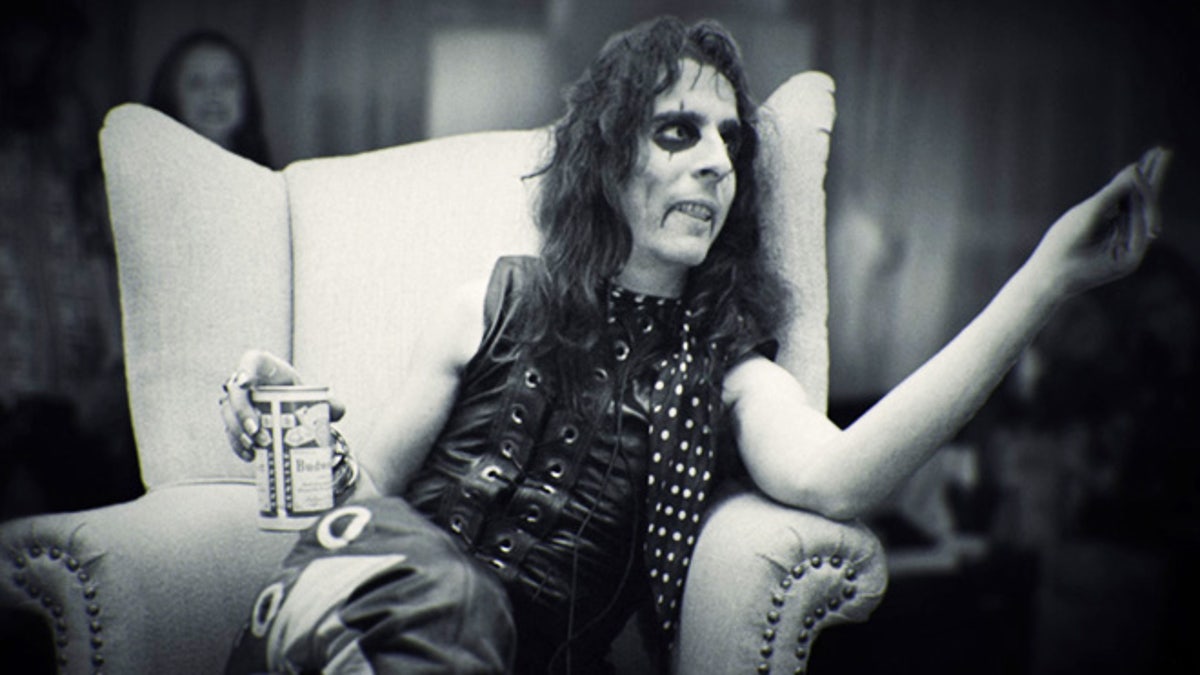
NEW YORK – Shock rock superstar Alice Cooper celebrates the Blu-ray and DVD release of his "Super Duper Alice Cooper" documentary this week, and he sat down with FOX411 to talk about how he separates his Jekyll and Hyde personalities, the secret to hanging yourself onstage, and the worst way to learn that chickens can’t fly.
FOX411: Super Duper Alice Cooper captures the two sides of your personality perfectly.
Cooper: I like the way they did it. The directors [Scot McFayden, Sam Dunn, and Reginald Harkema] were smart enough to say, “The Alice character is so theatrical, we can’t just do this like a regular documentary. It has to have a theme the same way your shows and your albums do.” When they came up with the Jekyll and Hyde thing, I said, “That’s brilliant. That’s perfect. That’s really the guts of the story.” It’s the story of me, and the dichotomy of the Alice character.
FOX411: Like you said at the beginning of the doc, you were the “perfect ’50s kid” with a moral compass thanks to your Christian upbringing.
Cooper: I was. I was just that normal kid, exactly. I grew up in that sitcom world where everything was all-American and all was okay, even though there was that side of me that saw the dark humor in everything. And that dark humor showed up later on in the music. That’s what directed me towards being the villain. There was a moment when I realized that rock and roll needed a Moriarty. But it took a while to perfect this character of Alice into a sophisticated, arrogant villain who would never swear to the audience. That would be… ungentlemanly.
FOX411: Alice had has own code.
Cooper: Yes! There were places he wouldn’t go. And I didn’t mind the idea that he’d slit your throat — but he might slip on a banana peel too. I liked that there could be a moment where the sophistication just falls apart right in front of the audience. And then he has to regain it.
FOX411: When did you feel you were “allowed” to be the other, friendlier Alice?
Cooper: I think a lot of that had to do with the fact that we’d do "The Tonight Show," and then I would sit down with Johnny [Carson] and I’d make him laugh. I didn’t mind doing those shows. I let that part out of the bag. The other guy, the Dr. Jekyll part of Alice, could do all the talk shows and fit right in. I could sit there with Frank Sinatra and all those guys and be fine with it.
But when I played the Hyde character, there was absolutely none of that. There was this mysterious, mythical, “Where the hell did this guy come from? He may come after me!!” (laughs) There were times we would put people in the audience who Alice would go after. It was a setup, but it really made people uncomfortable. It was all contrived, but it was great.
FOX411: Being Alice the character kind of became a 24-hour cycle for you.
Cooper: Yeah. I think there was that gray area when I was still drinking where I never knew where I ended and where Alice began. “I’ve got to go to a party tonight — do I bring out the snake, or do I put the makeup on?” And then I realized that’s what killed Jim Morrison. That’s what killed Jimi Hendrix, that’s what killed Janis Joplin. They didn’t know how to put the character into his/her compartment onstage and then when they left the stage, leave it there. It’s two different people.
FOX411: That realization probably saved you from a tragic legacy.
Cooper: It did. I mean, I was throwing up blood, and the doctor goes, “I give you two weeks before you join your buddies, the Hollywood vampires.” Oh, great. But, you know, Steven Tyler had to get there. Ozzy got there. Iggy got there. All the guys who are still with us and still performing had to get to that crossroads where they’re either going to live or die. And I decided to live.
FOX411: One of the major career moments you discuss in the film is the infamous “Chicken Incident” at the Toronto Rock ’n’ Roll Revival Festival on September 13, 1969.
Cooper: Isn’t it funny how that one incident became “The Story”? That might have been the turning point of me realizing the audience might have wanted a villain. I just saw a chicken, picked it up, and threw it in the audience, figuring it would fly away. I mean, it’s got feathers, right? But the audience killed the chicken and threw the parts back onstage. Next day in the paper, I was the geek. I was the Vaudeville sideshow guy who killed chickens with my teeth. That’s when I realized that’s what they were looking for. They wanted somebody who wanted to kill that chicken. (laughs)
FOX411: And then there’s no stopping. You had to get more theatrical.
Cooper: You have to remember at that point there was no Internet. It all became mythical. We opened for The Doors, and I would stand there and watch Jim Morrison, and honestly, I didn’t know what was going to happen. It was very volatile. He might fall off the stage and go into the audience. I put that in the back of my head: “That needs to be an element with Alice. There needs to be that moment of, ‘something could happen tonight.’ ” When I did the hangings onstage — that was basically a piano wire keeping me one inch from the actual noose. Every night, when that floor dropped out, there was always that moment of “Aahh!” Not just for the audience, but for me! (laughs)
FOX411: That was the key: We, the audience, didn’t know what would happen to you next. And you needed that visceral split second where the audience could see a flicker of worry on your face.
Cooper: Right — this could be the last night of Alice Cooper! You had to let the audience know this may be the last performance. “I was there when his head got cut off.” Or, “I was there when he broke his neck.” I always felt that was a really good part of the Alice Cooper show. (laughs)
FOX411: The other thing is the music was there to back up the theatrics. You guys were a fantastic band. Let’s not forget that when you say “Alice Cooper,” that’s also the name of the band itself.
Cooper: That’s right. And we were always the underdog. When we first started with the theatrics, we had to contend with people saying, “Take the theatrics away, and that band just isn’t any good.” Well, that drove us to nine hours of rehearsal on the music, and one hour on the theatrics. The theatrics came easy. That was nothing. Writing “I’m Eighteen” [in 1970], writing “School’s Out” [1972] — that was the trick.
FOX411: “I’m Eighteen” is a perpetual youth anthem. Every generation can instantly identify with that feeling.
Cooper: And what was the hook on it? “I’m eighteen, and I…(pauses) like it.” That was the hook right there. We looked at what songs were anthems, the songs that every kid in every generation can still buy into. “Summertime Blues.” “My Generation.” A 15-year-old kid hears that song right now, and he goes, “That’s me.” “Smells Like Teen Spirit.”
FOX411: Right. “Teen Spirit” is the “I’m Eighteen” of that generation.
Cooper: Yeah. A brilliant record, too. When I first heard it, I went, “Ohhh! Why didn’t I write that one?” (laughs) Because they needed to write it! But “I’m Eighteen” — that spoke to a whole entire generation. At eighteen, you became eligible for the draft, you could go to war. A lot of stuff depended on that age.
FOX411: And then we got “School’s Out” in 1972.
Cooper: When we wrote it, we were laughing, because I said, “This is such a hit.” It’s the only time I ever said, “If this isn’t a hit, I’m gonna go sell shoes.”
FOX411: When you wrote the line “school’s out for summer,” did you already know “school’s out forever” would come after it?
Cooper: It was almost like a flow of consciousness. “School’s out for summer…” (pauses) Well… “school’s out forever. School’s been blown to pieces.” If I had only said “summer,” it would have only been a summer song.
FOX411: A lot of parents wouldn’t have supported your music, but your father, who was a pastor, sure did.
Cooper: That’s right. My dad listened to The Who and The Stones and The Yardbirds and he went, “That swings, man. That’s good. That’s good stuff.” He was not, “Oh, that’s noise!” — he was, “Oh, that’s pretty cool.” For a pastor in the ’60s, to like that music — that was a very cool thing. There was only one thing my dad didn’t support: the lifestyle. He went, “Look, I love the show. I get your sense of humor. Your mind came out of my DNA. I get the character — he’s great. Musically and theatrically, I think it’s great. But I can’t buy into the lifestyle. As a Christian pastor, I can’t buy into you sleeping with a different girl every night, and that you’re drinking. Upfront, I will always warn you against that.”
FOX411: You found a way to reconnect with that moral compass of yours.
Cooper: Yes. If you don’t have that, what do you have? There’s just chaos. So I became the prodigal son. I came back to the church, because the church offered security. It offered something better than just another car and just another house. I had a pretty cool pastor, and I said to him, “I don’t know if I can play Alice anymore.” And he said, “Look where God put you. You’re a Christian. I don’t see any reason why you can’t play Alice and be a Christian. But your lifestyle is your testimony.” So I quit drinking. And I never cheated on my wife.
FOX411: Like you said earlier, you figured out how to leave it on the stage.
Cooper: Exactly. And there are limitations I’ve put on Alice now, but that doesn’t make him any less intense. I like the boundaries. I like knowing what he can and can’t do. Once I got the boundaries down, then I found I could really create even more with this guy.














































